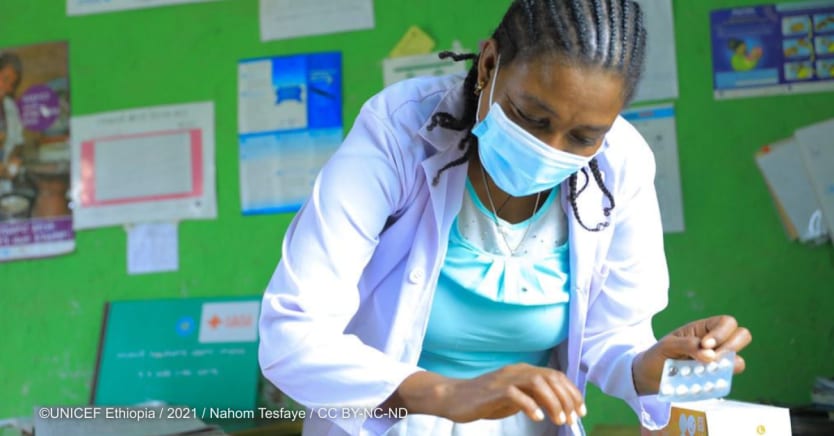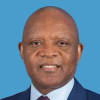Opinion: How health workers are leading Africa’s COVID-19 response

Over a year and a half ago, COVID-19 shook health systems globally. In Africa, where there are only 5 health workers for every 10,000 people, the impact was especially profound. As delegations get together during the United Nations General Assembly, we are calling on global leaders to prioritize investments in strong community health services that can help end the COVID-19 pandemic and achieve the vision of health care for all.
The key role of community health workers in crisis response — from Ebola to COVID-19 — cannot be overstated. They offer critical surveillance, provide testing and referrals, and maintain access to lifesaving primary care. We saw this during the Ebola epidemic in West Africa from 2014 to 2015, and we are seeing it now while community health workers around the world serve as crucial connectors to health care in “last mile” communities.
How to integrate community leaders into pandemic preparedness
A report from the Communities First Global Collaborative, which aims to amplify the work of community leaders globally, outlines ways that they can become a part of pandemic preparedness efforts.
With this in mind, Africa Centres for Disease Control and Prevention developed the Partnership for Accelerated COVID-19 Testing, which to date, has deployed more than 18,000 community health workers to “test, trace and treat” COVID-19 across 27 African countries.
PACT provides locally-recruited community health workers with training, personal protective equipment, supplies, and compensation. Since the onset of the pandemic, these community health workers have visited 2.5 million households, provided contact tracing for more than 1.6 million contacts, and facilitated testing referrals for more than 550,000 people.
Financing community-based care
However, COVID-19 is far from over. To end the pandemic and build resilient health systems for the future, we need to invest in community health workers and eliminate the daunting $5.4 billion annual funding gap that stands between Africa and a more equitable model of health for all.
To eliminate this funding gap, COVID-19 funding from domestic and external resources must align to scale up community health worker programs. These community health workers are critical for the pandemic response and they can be integrated into the public health system, providing essential routine care when the pandemic ends.
“Now is the time for the world to think boldly. Now is the time to innovate and collaborate. It is a time to advocate for what is possible … is not about talking. It is about doing, and community health workers have led the way,” Dr. John Nkengasong, director at Africa CDC, said recently during a webinar series hosted by the Ellen Johnson Sirleaf Presidential Center for Women and Development and Africa CDC on financing community-based systems.
We have seen this decisive leadership in action before.
Following the Ebola epidemic from 2014 to 2015, the Liberian government committed to putting a community health worker within reach of everyone, everywhere. Leveraging private capital, philanthropic funding, and international aid, it established a national community health worker program that is now a global exemplar.
Liberia’s community health workers provide the foundation for a resilient primary care system designed to respond to disease outbreaks and provide lifesaving services. In communities served by the national program in Liberia, community health workers now treat 45% of all reported malaria cases for children under 5.
With the vision in place, it’s time to act now. We must solidify commitments and political will with dedicated investments to support the successful implementation and scale up of community health worker programs on the continent.
Here we are sharing three key recommendations to guide the way forward, informed by the lessons we rapidly learned by deploying community health workers across 27 countries.
1. Support country-led community health strategies
Creating enduring change requires that we unite funders, the private sector, and implementing partners to support country-led strategies. To achieve the African Union commitment to recruit, train, and deploy 2 million community health workers in Africa, stakeholders must effectively engage with government partners to make long-term commitments.
In Ghana, a multisectoral approach to COVID-19 became a top national priority. The process has brought together ministries and technical agencies in various sectors, facilitating the development of resilient, community-based care, helping the country keep its COVID-19 fatality rates below 0.75%.
2. Integrate community health into national health systems
When community health workers are effectively integrated into primary health care systems, they serve as powerful connectors between remote populations and health facilities.
By bringing care to the doorsteps of their neighbors, they can save lives and take the burden off of existing health facilities. But they are only as effective as the health systems that support them. Nursing supervisors, informed policymakers, and effective supply chains are crucial to their success. To bring health care to the last mile, we need to link it to the first mile.
3. Establish a centralized database for community health resources
This nonprofit is helping communities stop pandemics in their tracks
COVID-19 has led to growing recognition of the work that Ending Pandemics, a San Francisco-based nonprofit, is doing to change how countries detect and respond to disease outbreaks.
In Africa, we’ve seen varied success implementing the PACT initiative across the continent. A regional database that counts health workers would inform policy decisions, and promote cross-country learnings to support sustainability, pandemic preparedness, and the continuation of essential health services. With regionally standardized resources and guidance, countries will be able to consult key resources to design and execute effective community health worker programs.
Community health workers have played a vital role in the pandemic response through early detection, community surveillance, and contact tracing. Now they have a critical role to play delivering vaccines from tarmacs to arms. As a global community — including donors, private institutions, implementing partners, and civil society — we must invest in the creation of a community health workforce that can help end this pandemic and prevent the next one.
We must learn from the failures and injustices of the past. We must capitalize on the successes of this pandemic response if we are to change history and build the required human capital for health that Africa deserves. If there is any time for bold ideas, that time is now.
Visit the Building Back Health series for more coverage on how we can build back health systems that are more effective, equitable, and preventive. You can join the conversation using the hashtag #BuildingBackBetter.

Search for articles
Most Read
- 1
- 2
- 3
- 4
- 5









